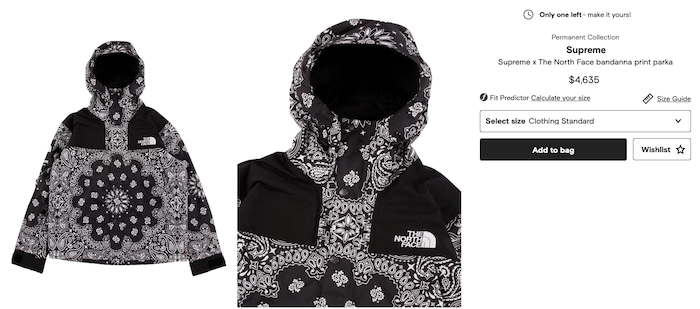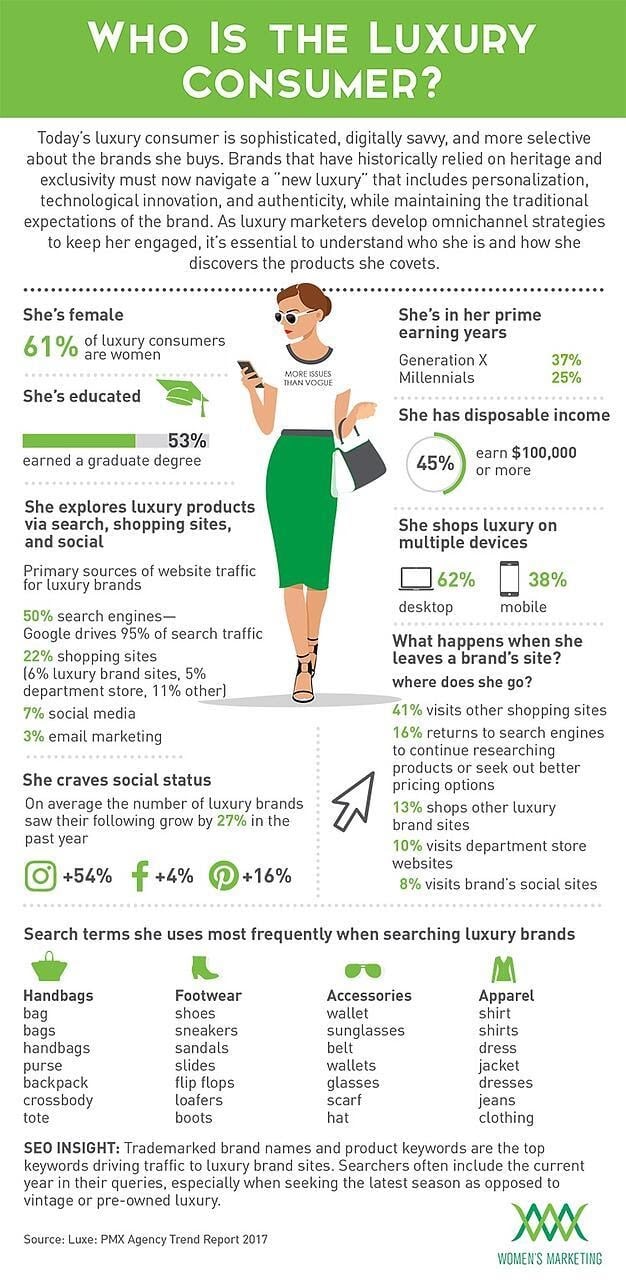The very best luxurious advertising methods
Have you ever seen a Facebook ad for Chanel? Or an Instagram ad for Lamborghini?
Neither do I. This is because luxury marketing strategies don't follow the same rules as mass market brands.
Selling to high-end consumers requires a different approach. However, this does not mean that popular digital channels are banned.
SEO, PPC, and even some social media websites can boost your luxury brand's online sales.
Today I'm going to show you exactly how to get your luxury brand online using the best luxury marketing strategies.
What is a luxury brand?
Gucci, Rolex, Ferrari. For the most part, if you hear about luxury brands, you will know them.
But what does a brand need to qualify as a luxury? In my opinion, it's down to the three es: Expensive, Excellent, and Exclusive.
Luxury products are synonymous with high prices. This is the most common indicator of luxury, but it is also the most misleading. Just because something costs thousands of dollars doesn't mean it's a luxury.
That's why luxury products have to be excellent. The quality must match the price. Well doesn't cut into the luxury category. A brand has to be at the top of the market.
Luxury fashion is created by the best designers in the world. The best engineers create luxury cars. The same goes for timepieces.
After all, luxury products have to be exclusive. It is not a luxury product if everyone has one. Exclusivity is often achieved through price. A handbag for ten thousand dollars is out of the reach of the majority of consumers. But brands can also achieve exclusivity by selling a limited number of products. Or, like Supreme, they can do both.

Luxury Marketing Trends
According to Statista, the global luxury goods market will grow from $ 285.1 billion in 2020 to $ 388 billion in 2025.
Despite what you might think, online sales of personal luxury goods are also growing. McKinsey estimates that 8% of all luxury sales are made online, or around 20 billion euros. This is a five-fold increase from 2009. Additionally, the majority (nearly 80%) of in-store purchases are influenced by digital purchases.
The consultancy predicts online luxury sales will triple by 2025, when nearly one in five in-person luxury sales will take place online.
Digital channels will be indispensable for luxury brands in the future. The pandemic hit department stores hard, forcing luxury consumers to buy more online than before.
BCG predicts that the e-commerce boom for both inspiration and transactions will continue into the future.
Digitization will also be the key to meeting the new luxury consumers of today and tomorrow. Millennials in their prime and Gen Z, many of whom are just starting to join the workforce, grew up in the digital age and expect brands to have an online presence that is as high quality as their products.
That means: digital marketing has to be an essential part of the future strategy of a luxury brand.
Marketing strategies for luxury brands
Luxury marketing is not yet synonymous with digital marketing.
Until now, luxury brands have been able to rely on full-page ads in premium magazines, billboards in duty-free stores, and high-end, high-budget TV ads.
No longer.
In order to survive in the increasingly competitive luxury space and attract new customers, luxury brands need to understand what the luxury consumer expects from a brand and how digital can help them get there.
From SEO to PPC, from apps to AR, there are tons of marketing strategies to discover.
Understand the luxury customer
The first step in developing a luxury marketing strategy is understanding your audience. Enter the buyer personalities.
A buyer personality is a detailed description of your ideal consumer. This includes age, population size, occupation, hobbies, salary and anything else that is relevant. The more details you can put in, the better.
Here is an example of a luxury consumer personality from Stella Rising.

Keep in mind; You may not have just one buyer personality. When several different groups of people buy your products, you need to develop a buyer personality for each individual.
In-depth buyer personalities help your brand understand exactly who your customers are and what they want from your brand.
They allow you to better communicate with your customers and focus your marketing efforts.
Develop your luxury digital marketing strategy
Now that you understand who your customers are and what they want from your brand, you can develop a marketing strategy that will produce results.
First, think about the channels that you want to target. This could be a social media platform that you want to pay special attention to. it could be google; It could even be a custom app.
Focus on one or two first, especially if your luxury brand is new to digital marketing.
Next, define your goals. This may increase brand awareness, but a better and more measurable goal is to increase sales. (It's also easier to measure sales growth.)
Finally, consider how you will measure your success. For example, if you want to increase sales with SEO, find out how much sales Google and Bing are currently responsible for. If you haven't set up Google Analytics tracking yet, you can set it up now.
Experimental vs. traditional marketing
Most marketers are familiar with the traditional tactics of luxury marketing. Full-page advertisements in premium magazines or weighty direct mail items are the be-all and end-all of a luxury marketer.
But these strategies won't make it in an increasingly digital world.
Many brands consider digital marketing to be experimental. However, I urge luxury brands to move beyond the usual digital marketing tactics and explore more experimental channels.
One option is a branded app. Apps allow brands to speak to users directly from their smartphone. Your app can be as simple as a mobile-responsive version of your website.
Or you can go even further by integrating augmented reality functions. For example, Burberry has launched an AR shopping tool that allows consumers to see Burberry products around them.
Chanel combined offline marketing with digital marketing in a holiday pop-up event at The Standard in New York. An AR app, accessible on the Chanel website or via Snapchat, brought the popup to life.
Role of Loyalty in Luxury Marketing
Luxury brands have loyal consumers. This is important because the more loyal your customers are, the less marketing you need to do.
Do not worry; I do not recommend creating a loyalty program. That could devalue your luxury brand.
Rather, you need to make the consumers extremely loyal brand advocates. One way to do this is through the quality of your products. Another way is through the quality of your marketing.
You can also collaborate with influencers on social media channels. Influencer marketing is incredibly inexpensive and, if done well, can bring your brand to the right consumers.
Just make sure you find influencers who are already in the luxury space and whose audience is buying the products they are promoting. Aspirational jet setting influencers are a dozen.
You want to work with the few who have the audience to keep it safe. Otherwise no results will be shown.
Develop a targeted strategy for luxury marketing keywords
Regardless of whether you are running an SEO campaign or a PPC campaign (or both), I recommend developing a targeted keyword strategy for luxury marketing.
Start by targeting high-conversion keywords. Of course, it is important to attract consumers in the research phase of their trip. However, in the interests of your ROI, you want to target consumers who are ready to buy.
The CPCs of luxury marketing terms can be expensive given the competition and the price of the products.
Try promoting "Top Watchmaker" on Google and you'll pay $ 80 per click. Ouch.
![]()
Or $ 50 to promote it as one of the best small luxury cars.
![]()
If you want to get a return on your investment, it is important to focus on high intent keywords.
You also need to use your negative keyword list carefully.
Unless you use negative keywords, you really don't have control over which terms your brand is displayed. The last thing you want is ads for your luxury brand to appear in "discount," "sale," or "free" searches.
The type of consumer who clicks on these ads does not match your buyer personality. Here's how to add negative keywords to your ads
Luxury Marketing Content Campaigns
A large part of luxury marketing revolves around storytelling. Whether it's the story of your brand or the craftsmanship of your products, you probably have a lot to say.
This makes content marketing campaigns a must for luxury brands.
What exactly should you write about? Aside from telling your brand story, I recommend using long text content to help consumers find the right product for them.
Buying a luxury product is often a big decision and consumers research their choices thoroughly before making a commitment. Buying guides put your brand first as they create value and build a relationship even before the purchase is made.
This is a strategy my team at NP Digital followed for a well-known jewelry retailer looking to increase online sales.
We've written a huge amount of content on finding the perfect engagement ring that increased search engine traffic from 20% of total traffic to 30% of total traffic in the first six months of our partnership.
Your content can continue to add value for customers after purchase. Detailed guides on how to use and care for luxury products make for great blog posts that can increase brand loyalty while attracting even more consumers.
Use the keywords you discovered above to control the process of content creation. You want to make sure that there is some form of content for every keyword, whether it's a category page, blog post, or something else entirely.
SEO for luxury brands
Search engines are massive traffic drivers for luxury brands and play an important role in both the research and purchase phases of the consumer journey.
However, they are consistently adopted by luxury brands. It doesn't help that luxury brands tend to have poorly designed (but very good looking) websites and a lack of content for Google to crawl.
As I said earlier, creating new content is vital for luxury brands that want to thrive online. Targeting new keywords with high intent is also important.
However, you shouldn't forget about the more technical aspects of search engine optimization like optimizing category pages. Or off-page factors like creating links.
The more time and effort you put into understanding and implementing SEO, the more revenue your business should generate. For example, we increase our luxury jewelry customer's sales by 21% through SEO.
While Google should be your focus, don't forget about Bing. Microsoft search engine users tend to be wealthier, with 25% of users having incomes below the top 25%. It makes sense to focus some effort on Bing SEO.
Conclusion
The luxury market is changing.
Luxury marketing can no longer be limited to television channels, billboards and glossy magazines. Now is the time to go digital with your luxury brand and invest in SEO, PPC, and all the social media your customers use.
Here is my question for you:
What is the first digital channel you will use to promote your luxury brand?
